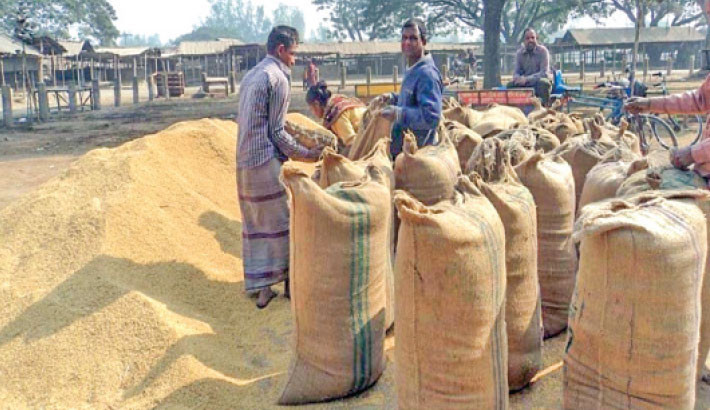Govt paddy procurement tussles in Bagerhat despite ample harvest
Bishnu Prasad Chakraborty, Bagerhat
Published: 24 Feb 2025

Photo: Daily Sun
The Food Ministry is facing challenges in meeting its paddy procurement target in the Bagerhat district during the ongoing Aman season, despite a satisfactory yield.
Many farmers have lost interest in supplying paddy to food warehouses due to higher prices in the local market. Farmers report that the government-set procurement price is approximately Tk100 less per maund than the prevailing market price, discouraging them from selling paddy to the Food Department. Additionally, issues such as syndicates and complicated rules and regulations further diminish their interest in selling to the Food Department.
Farmers have suggested that the government should simplify the procurement process by visiting their homes to purchase rice directly, avoiding the complications associated with various rules and regulations. They also believe the government procurement price should exceed the market price.
The government has set a target of procuring 3,902 tonnes of paddy from nine upazilas in Bagerhat district. The procurement drive began on 17 November 2024, and is scheduled to conclude on 28 February 2025. The government’s paddy procurement price is Tk1,320 per maund, while local market prices range from Tk1,400 to Tk1,420 per maund.
Currently, the Food Department has indicated that it is unlikely to meet the Aman paddy procurement target in Bagerhat by February 28. Due to the low government price, not a single quintal of Aman paddy has been procured so far.
According to official data from the district food department, the procurement targets are as follows: 409 tonnes from Bagerhat Sadar, 1,139 tonnes from Morelganj, 505 tonnes from Rampal, 478 tonnes from Sharankhola, 160 tonnes from Mongla, 284 tonnes from Fakirhat, 207 tonnes from Mollahat, and 337 tonnes from Kachua. Additionally, a target of 383 tonnes of paddy has been set for Chitalmari upazila.
Furthermore, the government aims to collect 3,304 tonnes of boiled rice from the nine upazilas of the district, of which about 92% has already been collected.
Saifur Rahman Nathu from Fatepur village in Bagerhat Sadar upazila stated that he cultivated Aman and Boro paddy on his 20 bighas of land. Last season, he attempted to sell Aman paddy at government warehouses but was deterred by complex rules and regulations. Consequently, he is not trying to sell paddy to the government warehouses this season.
Tarun Kumar Pal from Fatehpur village reported cultivating Aman paddy on four bighas of land this year, yielding 120 maunds due to favourable conditions. He expressed, “Government warehouses refuse to accept paddy if the moisture content is slightly high or if there are any minor issues. Furthermore, I’ve learned that there are numerous complex rules to follow before selling paddy to the government. With the higher market prices this year, I’m not interested in selling to the government.”
Sheikh Muhammad Mizan from Baruipara village in Bagerhat Sadar upazila noted that he cultivated Aman paddy on two bighas of land, and after threshing, a trader bought the rice directly from his house.
Acting Bagerhat District Food Controller Shakil Ahmed explained that to sell rice in government warehouses, farmers must have an agricultural ID card. According to the rules, after receiving approval from the Agriculture Department, farmers can bring between 120 kg and 3,000 kg of paddy to the warehouses. The moisture content is required to be at 14%. He assured that payment for purchased paddy would be directly deposited into farmers’ bank accounts.
Shakil Ahmed indicated that farmers are reluctant to sell due to the government’s procurement price being lower than market prices. He noted that most of the rice in the region has been purchased by traders from northern areas due to the free-market economy.
Shankar Kumar Majumder, deputy director of the Bagerhat District Agricultural Extension Department, stated that this year, Aman rice was cultivated on 73,234 hectares of land in the district, resulting in a total production of 277,800 tons of paddy. There are approximately 244,328 farming families in the district, of which 147,000 are engaged in Aman rice farming.
Majumder emphasized that while this year’s yield of Aman paddy has been good, the government should simplify the procurement process and increase the prices to encourage farmers' participation.

